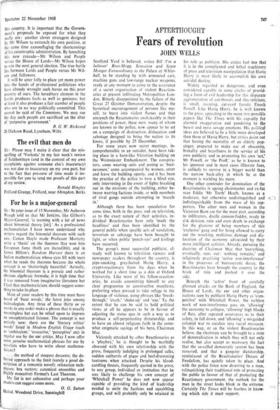For he is a major-general
Sir: In your issue of 15 November, Mr Auberon Waugh told us that Mr Jenkins, like Gilbert's Major-General, 'is teeming with a lot of news about binomial theory [sic].' As a professional mathematician I have never understood why writers regard the binomial theorem with such awe. Conan Doyle made Professor Moriarty write a 'thesis' on the theorem that won him European fame (both are incredible), and in James Hilton's Random Harvest there is an Indian mathematician whose eyes fill with tears when he reads the theorem because the whole concept is so 'shatteringly beautiful.' Actually, the binomial theorem is a prosaic and rather obvious algebraic formula; it is high time that it was removed from imaginative literature but I feel that mathematicians should suggest some- thing to take its place.
Most of your readers by this time must have heard of 'buzz words,' the latest joke among technologists. Any three of these thirty or so words in any order make a phrase that is usually meaningless but can be relied upon to impress an unsophisticated listener. The concept is not entirely new; there are the 'literary critics' words' listed in Modern English Usage (such as `ambivalent,' evocative,"perceptive' etc) in regular use by the Bac critics. May I now offer some genuine mathematical phrases for use by novelists who have to write about mathema- ticians?
• . the method of steepest descents; the de- ferred approach to the limit (surely a good de- scription of a romantic novel); relaxation tech- niques; bra vectors; canonical ensembles and (highly evocative) Fermat's Last Theorem.
My list is not exhaustive and perhaps your readers can suggest some more.
0. G. Sutton Hafod, Woodend Drive, Sunninghill


































 Previous page
Previous page